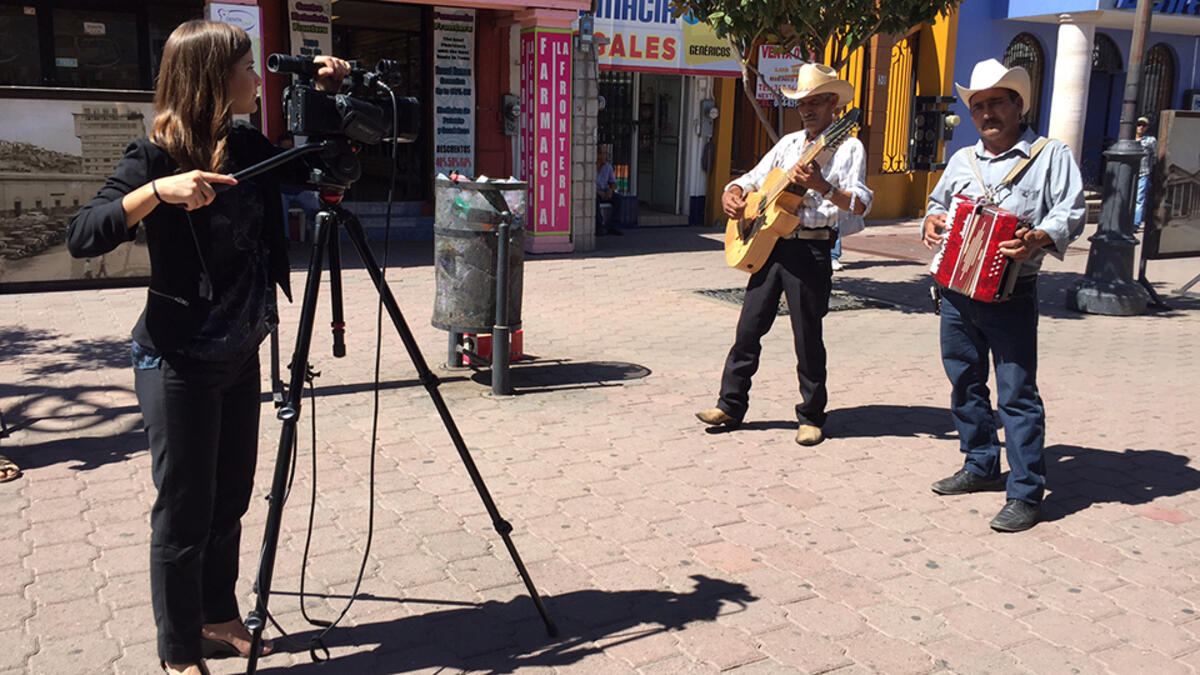Cronkite School, Arizona PBS launch crowdfunding campaign to expand coverage of immigration, border

The Cronkite School and Arizona PBS are starting a crowdfunding campaign that will enable Cronkite News to send students to the border to cover immigration, security and other topics.
Arizona State University’s Walter Cronkite School of Journalism and Mass Communication and Arizona PBS today kick off a crowdfunding campaign to help Cronkite News students increase coverage of border and immigration issues during this election year.
The Cronkite School is the first journalism program in the nation to establish a major partnership with Beacon, an innovative crowdfunding platform that helps national news organizations and independent journalists raise funds for reporting projects.
The crowdfunding campaign will enable Cronkite News, the student-produced news division of Arizona PBS, to send students to the U.S.-Mexico border and enhance the reporting tools they can use to better understand immigration, security, the economy and other issues.
“More than 15 million people live on both sides of the U.S.-Mexico border, and too often they are missing from news coverage,” said Cronkite School Dean Christopher Callahan. “We are excited to be partnering with Beacon on this project, which will equip our students with important reporting skills and provide borderlands news coverage during a year in which presidential candidates are debating these types of issues."
The 30-day crowdfunding campaign’s goal is $25,000. With every pledged dollar, Beacon will match donations if the campaign reaches its goal. People can pledge their support at the Cronkite News Beacon page.
Student journalists will produce stories that bring to light diverse political insights and perspectives and explore new ways of storytelling, using cutting-edge media and technology. The initiative is part of Cronkite News – Borderlands, where students cover border issues in English and Spanish under the guidance of award-winning professional borderlands journalists Alfredo Corchado and Angela Kocherga.
As part of the crowdfunding campaign, the Cronkite School will offer rewards to donors based on their level of support. Those include thank-you letters, insider reports from the CN-Borderlands bureau and invitations to lectures and other events.
The Cronkite School also will test and analyze which types of audiences are most likely to contribute and whether crowdfunding is a viable ongoing revenue source for student-based media. Cronkite News has received a $10,000 grant from the Institute of Nonprofit News to support this endeavor.
Launched in 2013, Beacon works with journalists and readers to fund important stories around the world. Journalists create crowdfunding pages on Beacon, detailing the reporting project, and readers decide whether to make a contribution. Crowdfunding is becoming an important revenue source for news organizations, particularly non-profit newsrooms.
“Crowdfunding for journalism works best when you combine an important issue with a trusted newsroom, willing to engage with its audience,” said Dan Fletcher, Beacon’s co-founder. “With those traits in mind, the Cronkite School is the perfect university to pioneer this project.”
More Law, journalism and politics

Exhibit uses rare memorabilia to illustrate evolution of US presidential campaigns
After one of the most contentious elections in history, a new museum exhibit offers a historical perspective on the centuries-old…

TechTainment conference explores the crossroads of law, technology, entertainment
What protections do writers, actors, producers and others have from AI? Will changing laws around name, image and likeness (…

How to watch an election
Every election night, adrenaline pumps through newsrooms across the country as journalists take the pulse of democracy. We…